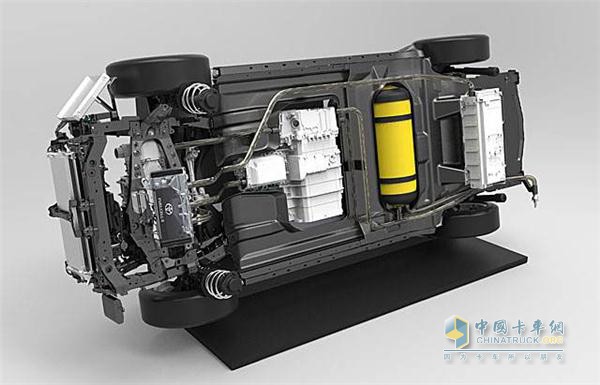In recent years, there have been frequent commercialization of foreign fuel cell vehicles. First, Toyota and Honda have successively launched mass-produced fuel cell models, and increased investment in the construction of hydrogen refueling stations. After that, General Motors, Honda's joint venture established by the Fuel Cell System Manufacturing Corporation (FCSM) company formally entered the substantive operation stage. Domestic development has a foundation The foreign hydrogen fuel cell market seems to be in full swing, but the domestic industry is thundery and rainy, and the development speed is too slow. This is because of lack of technology or policy imperfections? In fact, the domestic fuel cell vehicles in the past few years is gradually increasing attention, but also has a reserve of certain technologies. Fu Yu Wu, director of the China Engineering Society, told reporters that in the past decade or so, China has initially mastered key technologies for fuel cell key materials and stacks, power systems, vehicle integration, and hydrogen energy infrastructure, and has basically established autonomous knowledge. The property-based fuel cell vehicle power system technology platform has achieved the production capacity of 100-class fuel cell power systems and vehicles. In recent years, China’s policy support has actually increased. As fuel cell vehicles are one of the future development directions of new energy vehicles, China’s determination to support its development is unquestionable. In the “Energy-saving and New Energy Vehicle Technology Roadmap†published at the annual meeting of the China Automotive Engineering Society last year, fuel cell vehicles have been recognized as future together with energy-saving vehicles, pure electric vehicles and plug-in vehicles, and intelligent network-linked vehicles. China's development goals. Industrialization distance Since there are technical reserves and policy support, why is the domestic fuel cell vehicle industry still more talked about? An industry source who declined to be named told reporters that due to high production costs, lack of user awareness, and product reliability There is still a large gap between the sex and life expectancy and foreign technology, so the domestic fuel cell vehicle industry has not yet entered the stage of commercialization. In addition to the above reasons, delaying the development of the fuel cell vehicle industry is the development of hydrogen refueling stations in China. Currently, there are only four hydrogen refueling stations in China, and they are located in four different cities in Beijing, Shanghai, Zhengzhou, and Shenzhen. Both in terms of quantity and scale, they lag far behind Europe and Japan. From the standard aspect, China's fuel cell auto industry also needs improvement. Although China has already established standards for the construction of hydrogen refueling stations, there are already detailed regulations for the “Hydrogen Refueling Station Technical Specification†GB50516-2010 issued in 2010. However, this standard has existed for 7 years. Many regulations do not apply to the current development situation. For example, the strict control of liquid hydrogen has affected the efficiency of hydrogen storage and transportation. Domestic and foreign cooperation is the key When asked how to promote the development of the domestic fuel cell vehicle industry, Chen Jianhao, deputy general manager of Guangdong Guohong Hydrogen Energy Technology Co., Ltd., said that the current domestic fuel cell system has a high degree of dependence on foreign technology. This is because there are no mature products in the country, and most of the technologies are still in the R&D stage. Products cannot be put into the market on a large scale. If you want to enter the product stage as soon as possible, cooperation with foreign companies is currently the best solution. The words of Ouyang Minggao, director of the National Energy Conservation and Safety Laboratory and professor at Tsinghua University, may better explain the stage in which China's fuel cell vehicle industry is located. He believes: “The fuel cell vehicle industry in China has only opened up the technology chain, but the industrial chain has not been formed. , the core products depend more on foreign countries." To solve the above problems, it is necessary to work together both inside and outside the industry to increase the capital investment in the fuel cell vehicle industry and increase the product conversion rate. Because only the continuous investment of capital and the entire industry form a synergy effect, can improve the industrial competitiveness, thereby shortening the product development cycle, reducing the overall R & D costs, and promoting the development of hydrogen energy industry. Motor Grader Motor Grader,Small Motor Grader,Road Grader,Grader Machine SINO HEAVY MACHINERY CO., LTD. , https://www.sinoauto-machinery.com Fuel cell
Fuel cell
â— It adopts an articulated frame and cooperates with the steering of the front wheels. It has a small turning radius and is flexible.
â— Electro-hydraulic power transmission control gearbox, forward six gears, back three gears.
â— The use of international supporting hydraulic parts, reliable work.
â— Blade action is full hydraulic control.
â— The rear axle is a drive axle with a self-locking differential.
â— Adjustable console, seat, joystick and instrument layout are reasonable, easy to use, improved driving comfort.
Foreign hydrogen fuel cell market is in full swing. Why do you have little thunder and rain?
According to foreign media reports, the United States hydrogen power leading company Plug Power Inc (Plug referred to as the company) recently said that it has reached an equity purchase agreement with online e-commerce giant Amazon, Amazon will acquire up to 23% of its shares. In addition, according to the agreement, electric forklifts in Amazon's retail warehouse will begin to replace the use of fuel cells provided by Plug.